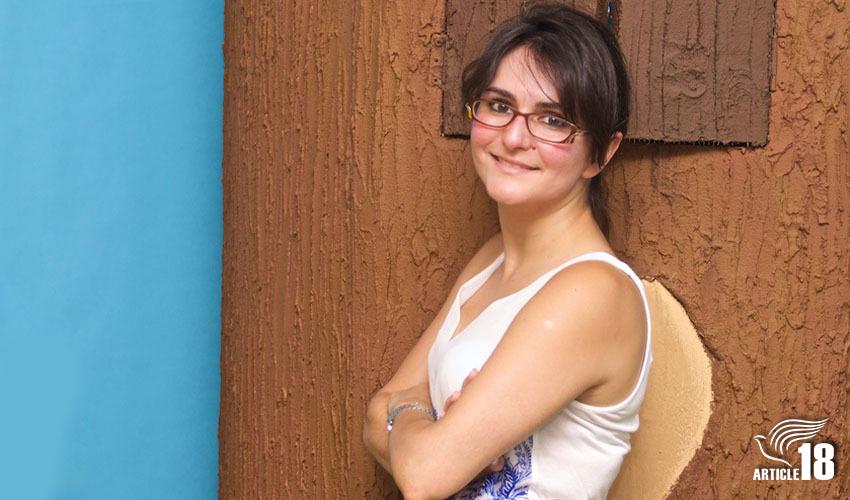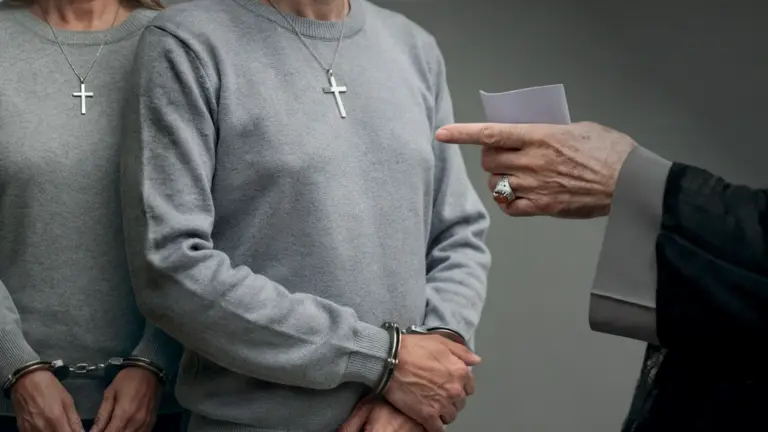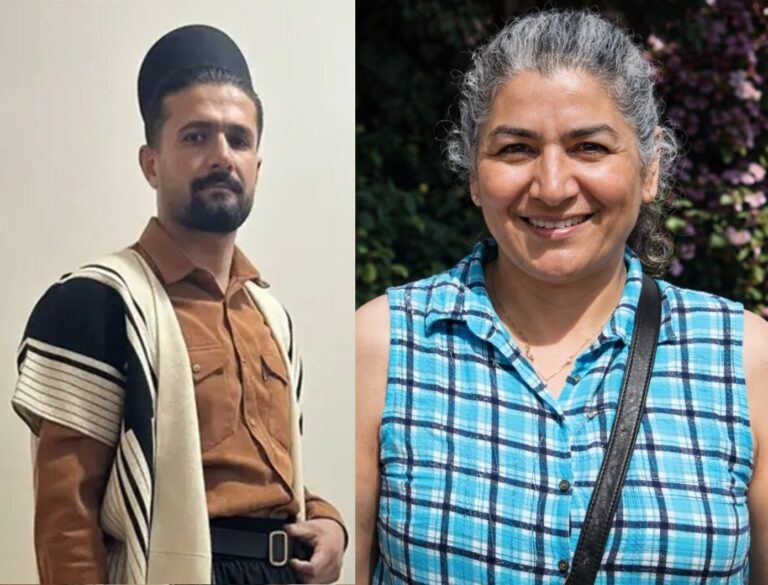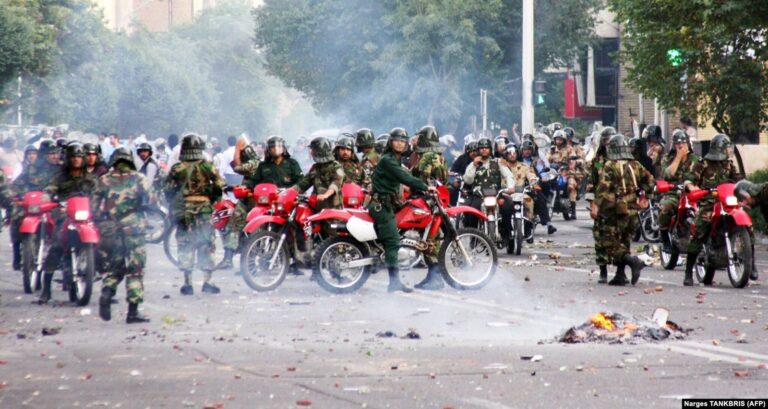
An Iranian Christian convert has won the top prize in an international film competition* for her short animation depicting a fictional world in which there is no religious freedom.
Maral Karaee’s “District 18” tells the story of a little girl who lives in a world where people of different colours are not allowed to mix. When the girl breaks the rules, she is fired from her job and made an outcast.
But then she strays upon District 18, a land where people of all colours – or beliefs – are allowed to mingle. At the entrance to District 18, there is a sign with the words of article 18 of the Universal Declaration of Human Rights: “Everyone has the right to freedom of thought, conscience and religion”.
Below, the creator, 38-year-old Maral Karaee, who now lives in Canada, tells Article18 about what motivated her to make District 18 and why religious freedom is important to her:
Please can you tell us about your animation, and what messages you are trying to convey?
The competition was actually about article 18 of the Universal Declaration of Human Rights. The goal was to show women in societies and also workplaces, and it was important to show how, if you give religious freedom, especially to women, how it can lead towards a better society and a better economical status for the society.
That was the topic, and of course it was a bit challenging – how to show this in a three-minute animation? The first thing that came to my mind was colours, and I decided to put people in different colours. I chose four colours: red, green, yellow and blue. There is no reason why I chose these colours, but because I couldn’t show all the colours of the world in one short film, so I decided to use primary colours – red, yellow and blue – and then I also added green because I love green.
So I am actually showing diversity, tolerance, even racism, trying to cover those topics by showing the different colours. And in the fictional world that I created, the tolerance is so low that they are not allowed to interact with each other in any way – not even able to help each other; not even able to try products of the other colour; not even allowed to interact with the animals of the other colour. They are even afraid of the animals of the other colour!
So that’s the society that she’s living in. She’s not happy. On purpose, I didn’t use any background music in the first half of the film to give the feeling of emptiness. Also there are no trees or plants in this city and neither any children. And the rest of the people, I tried to give them a very neutral expression, almost no expression, but you see the sadness in the face of the girl, until she decides to help the little yellow mouse – because she remembers what happened to the green pigeon and doesn’t want the same thing to happen to the mouse. So she helps him, but as a consequence she gets fired, because she is now mixed with another colour.
And that’s how she goes and finds District 18, and it’s a place where human rights and article 18 is celebrated.
Was the girl just a fictional character, or was she shaped by any of your personal experiences, or those of others you know?
I would say that the girl could be many of the women who are under these kinds of limitation. So I wouldn’t say that it’s exactly myself, but it can be any of those women.
And were you thinking specifically about Iran while making your film, or more broadly other places?
Because I come from Iran and because I know that society better than any other – I mean the limitations of that society – I would say that perhaps somehow I am trying to show Iran, but at the same time also a lot of other places in the Middle East and even worldwide.
Are there any parallels with your own story, if you don’t mind sharing your story and how and when you became a Christian?
Well, actually my conversion took place in the Netherlands. But I would say that I feel very privileged to have lived in free societies, democratic countries such as the Netherlands and now Canada, that I don’t have the fear of persecution, but I know that many of my brothers and sisters don’t have this privilege, and I always remember them. I know that there are so many that are now in jail because of their faith.
So personally I didn’t experience persecution, though one thing that did happen to me is that I cannot go back to my country anymore. And that’s a result of my faith.
Is there one particular limitation, among those you highlight, that most resonates with you?
I would say being different, and feeling the pressure from the society – the fear of being judged by your loved ones, and the intolerance that you might receive. This is the biggest one that resonates with me regarding the girl in the movie: the fear of being neglected, rejected.
Do you think the limitations faced by the girl in your story would be different for a boy? And, if so, how?
That’s a very difficult question because nowadays we see that the persecution is for both boys and girls.
I remember that very recently in the news, there was a boy, a very intelligent, smart boy who was banned from school, from continuing his education, just because he comes from a Baha’i family.
There are so many boys and girls in the jails because of what they believe, but maybe for women the pressure is higher because they have always been considered as the second gender; they’ve always been looked down upon – and maybe especially in workplaces.
Do you mean especially in Iran?
Yeah, I’m thinking about Iran. Maybe I can give you an example, like sport. A boy can easily travel abroad as a professional sport player, but the limitations for women and girls are much, much higher because, when a girl wants to travel abroad for the Olympics, or any sports match, there is always the question of: what is she going to wear? That’s always a challenge for women and girls. Whether it’s swimming or wrestling, or even jogging, running, it’s always a question, and many times women have been banned because of it.
Also, because of the discriminatory laws girls must officially get the permission to travel abroad from their father, and married women from their husbands.
And what about when it comes to religious freedom? Do you think girls are especially vulnerable?
Yes I do think that is the case; women are more under pressure. When I look to my home country, I see that, if I talk about Christians, for example, nowadays we have a lot of women leaders, but usually the case is that these women, they come to Christ, but when their family figure it out, they are rejected from their family.
And at the same time, all religious minorities, especially Christians converts and Baha’is, face systematic state persecution.
Girls are considered the second gender in Iran, and therefore they face double vulnerability. And maybe women are coming to Christ because they are more under pressure, generally speaking.
Why is religious freedom important to you?
By giving freedom of religion, you are not only opening the doors for peace in the society, but it can even help the economy. For example, in so many small businesses in Iran, religious minorities are banned or they shut down their business.
But if there is religious freedom, it could even help the economy. For example, a Baha’i, Christian or dervish could easily be part of the economical growth of the society; it’s a benefit to everyone. But they’re cut off, they’re banned. Just like in education and a lot of things.
By winning the competition, you have been invited to talk to business leaders in Tokyo ahead of next year’s Paralympic Games. What message will you take with you?
I always wanted to make an impact that reflects my own faith, and to help others to experience religious freedom. But also I hope that maybe like with the issues of gender equality and Black Lives Matter that are trending now, I hope that leaders pay more attention to religious freedom globally and especially in workplaces.
Is animation your full-time job?
Over the past couple of years, I’ve been more focused on producing multimedia for Persian-speaking children. But now, after making this short animation, I would like to focus more on film-making. This is something that I always wanted to do but I never found the time. So this was a great opportunity.
And actually, the main production of this animation happened during the lockdown. The pre-production was last year, but the main production was during the lockdown. And it happened that a few projects of mine got cancelled because of the pandemic, so I had full-time to sit and work on this movie, and I really enjoyed it – really, really enjoyed it; it was like art therapy to me! And when I finished it, it felt really good and my husband said that, by God’s grace, I managed to turn a mess into a message.
And this is something that I want to continue; I want to be a film-maker. I am passionate about storytelling and, God-willing, this is what I want to continue. I’m already writing my next story!
What’s it going to be about? Can you say?
Maybe I’ll reveal a little bit of it! It’s actually going to be about these days, the pandemic. It’s about a boy, and some of the challenges that this little boy has during the pandemic time.
Is there anything else you’d like to add?
Well, one thing I’d like to add is that, as an artist, one of the biggest challenges is always to overcome your fear, and showcase your work – out there, to the public. Because you are always afraid of what people are going to think and how they’re going to judge your work, and the fear that they might find it very stupid.
So maybe, if there are younger audiences who are going to read this interview, I would like to tell them not to be afraid and really to follow their heart and their passion.
*The competition was co-sponsored by Empower Women Media and the Religious Freedom & Business Foundation.



0 Comments
Trackbacks/Pingbacks